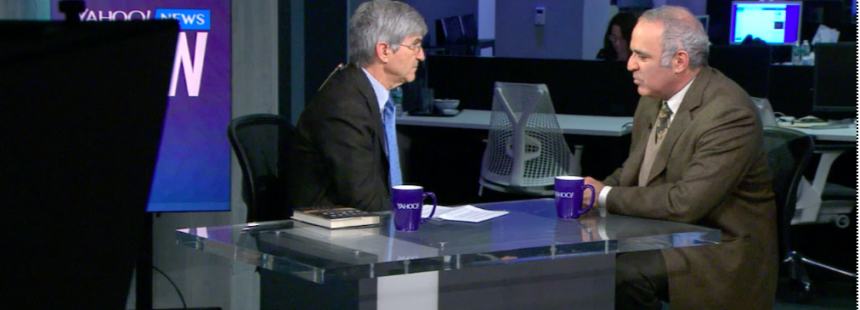

Former world chess champion Garry Kasparov, a Russian dissident now living in exile in the United States, warned today that the world could be what he called “entering a very dark ages” unless President-elect Donald Trump reverses course and stands up to Vladimir Putin.
In an interview with Yahoo News chief investigative correspondent Michael Isikoff, Kasparov said that Putin and his top aides, including Russian Foreign Minister Sergei Lavrov, are eagerly anticipating Trump’s presidency because they believe he will cut a “grand bargain” with Russia that will expand its sphere of influence.
“They are all waiting for Trump,” Kasparov said. “They believe Trump will change everything … and [give] in to all of Putin’s demands — recognizing Russian annexation of Crimea,” as well as undercutting NATO and “sacrificing the Baltic states.”
“I think that’s a crime,” Kasparov added. “Unless the United States is willing to restore the balance, we are entering a very dark ages.”
Kasparov, the author of a new book, “Winter Is Coming: Why Vladimir Putin and the Enemies of the Free World Must Be Stopped,” has been a thorn in Putin’s side for years. While he still lived in Moscow, he helped to spearhead the political opposition to the Russian leader, but he moved to New York several years ago, because, he said in the interview, he feared for his life.
The Senate Armed Services Committee is planning hearings Thursday on Russia’s hacking attacks against the American political system — a move that Kasparov said was part of the Russian leader’s strategy to undermine Western democracy. He urged U.S. officials to retaliate with far stronger measures than President Obama’s expulsion of 35 Russian diplomats and sanctions on four top military intelligence officials.
“You have to go after Putin’s wealth,” he said. “You have to demonstrate how much money has been stolen from Russia. American intelligence — they know exactly where this money is being kept. So they have to go after the core of Putin’s power, his ability to manipulate the hundreds of billions of dollars taken out of Russia in the hands of Russian oligarchs. He uses this cash for his clandestine operations. You have to send a message.”
To illustrate how dangerous Putin is, Kasparov cited the assassination of his good friend and fellow opposition leader, Boris Nemtsov, who was shot in the back four times while crossing a bridge near the Kremlin on Feb. 27, 2015. Nemtsov at the time was organizing protests against Russia’s military intervention in Ukraine. (Five Chechens are now on trial for the murder, although no motive has been established. Russian officials have suggested the murder was a “provocation” that was intended to benefit the opposition to Putin.)
“He was a great man, the bravest of all of us,” Kasparov said of Nemtsov. “He actually told me in 2013, ‘Leave the country, Gary, it’s no longer safe for you to stay here. But he stayed. … He believed he had to stay in Russia and fight Putin. And he was blasting him on a daily basis. And he was murdered in front of the Kremlin — an opposition leader being shot in the front of the Kremlin, where you have more video surveillance than Fort Knox, with all the cameras going blind. It tells you who did it. It’s just another crime that shows you Putin will not stop short of doing anything to stay in power.”
Kasparov was asked if he feared for his life.
“Look, I live in New York for that reason,” he replied. “There are certain countries in the world that I don’t visit. But there’s nothing I can do. If Boris and many others fought [Putin], I have to do my duty.”
Nemtsov, he added, had often said that while Putin was Russia’s problem, “eventually he is going to be everybody’s problem. So if Vladimir Putin is everybody’s problem, and the sooner we realize there is no peace as long as he stays in the Kremlin, the less people will be killed.”

